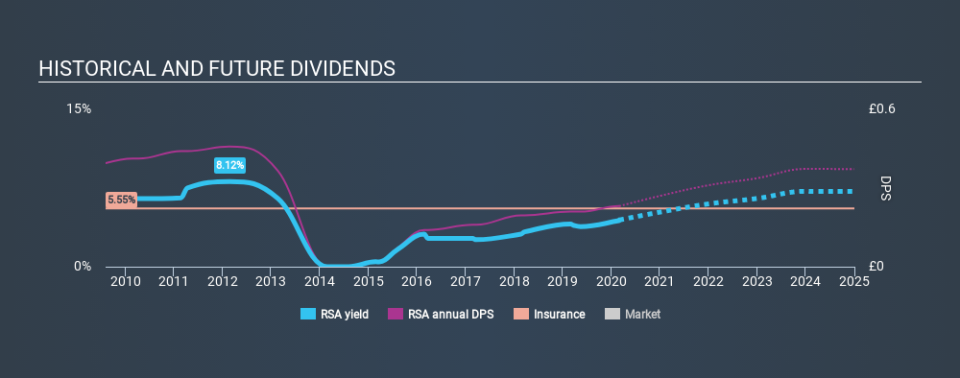Is It Smart To Buy RSA Insurance Group plc (LON:RSA) Before It Goes Ex-Dividend?

Readers hoping to buy RSA Insurance Group plc (LON:RSA) for its dividend will need to make their move shortly, as the stock is about to trade ex-dividend. If you purchase the stock on or after the 5th of March, you won't be eligible to receive this dividend, when it is paid on the 14th of May.
RSA Insurance Group's next dividend payment will be UK£0.16 per share, on the back of last year when the company paid a total of UK£0.23 to shareholders. Last year's total dividend payments show that RSA Insurance Group has a trailing yield of 4.5% on the current share price of £5.188. Dividends are an important source of income to many shareholders, but the health of the business is crucial to maintaining those dividends. So we need to investigate whether RSA Insurance Group can afford its dividend, and if the dividend could grow.
See our latest analysis for RSA Insurance Group
Dividends are typically paid from company earnings. If a company pays more in dividends than it earned in profit, then the dividend could be unsustainable. RSA Insurance Group is paying out an acceptable 71% of its profit, a common payout level among most companies.
Companies that pay out less in dividends than they earn in profits generally have more sustainable dividends. The lower the payout ratio, the more wiggle room the business has before it could be forced to cut the dividend.
Click here to see the company's payout ratio, plus analyst estimates of its future dividends.
Have Earnings And Dividends Been Growing?
Stocks in companies that generate sustainable earnings growth often make the best dividend prospects, as it is easier to lift the dividend when earnings are rising. Investors love dividends, so if earnings fall and the dividend is reduced, expect a stock to be sold off heavily at the same time. That's why it's comforting to see RSA Insurance Group's earnings have been skyrocketing, up 45% per annum for the past five years.
The main way most investors will assess a company's dividend prospects is by checking the historical rate of dividend growth. RSA Insurance Group has seen its dividend decline 5.2% per annum on average over the past ten years, which is not great to see. RSA Insurance Group is a rare case where dividends have been decreasing at the same time as earnings per share have been improving. It's unusual to see, and could point to unstable conditions in the core business, or more rarely an intensified focus on reinvesting profits.
The Bottom Line
From a dividend perspective, should investors buy or avoid RSA Insurance Group? Earnings per share are growing at an attractive rate, and RSA Insurance Group is paying out a bit over half its profits. We think this is a pretty attractive combination, and would be interested in investigating RSA Insurance Group more closely.
Wondering what the future holds for RSA Insurance Group? See what the ten analysts we track are forecasting, with this visualisation of its historical and future estimated earnings and cash flow
We wouldn't recommend just buying the first dividend stock you see, though. Here's a list of interesting dividend stocks with a greater than 2% yield and an upcoming dividend.
If you spot an error that warrants correction, please contact the editor at editorial-team@simplywallst.com. This article by Simply Wall St is general in nature. It does not constitute a recommendation to buy or sell any stock, and does not take account of your objectives, or your financial situation. Simply Wall St has no position in the stocks mentioned.
We aim to bring you long-term focused research analysis driven by fundamental data. Note that our analysis may not factor in the latest price-sensitive company announcements or qualitative material. Thank you for reading.

 Yahoo Finance
Yahoo Finance 
